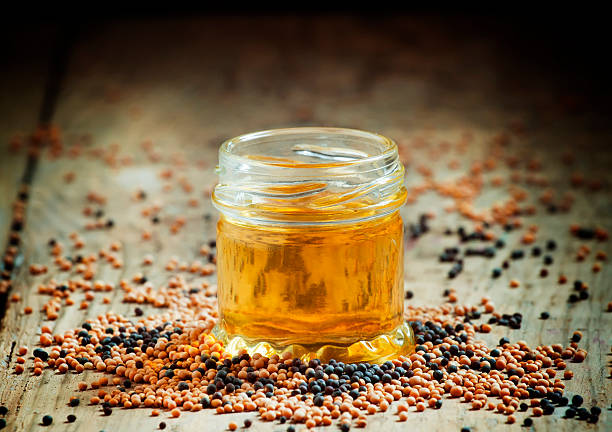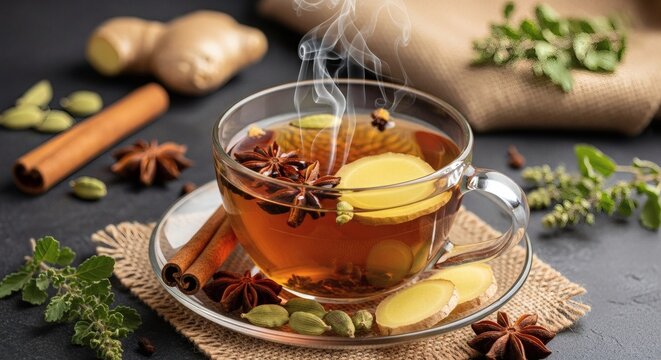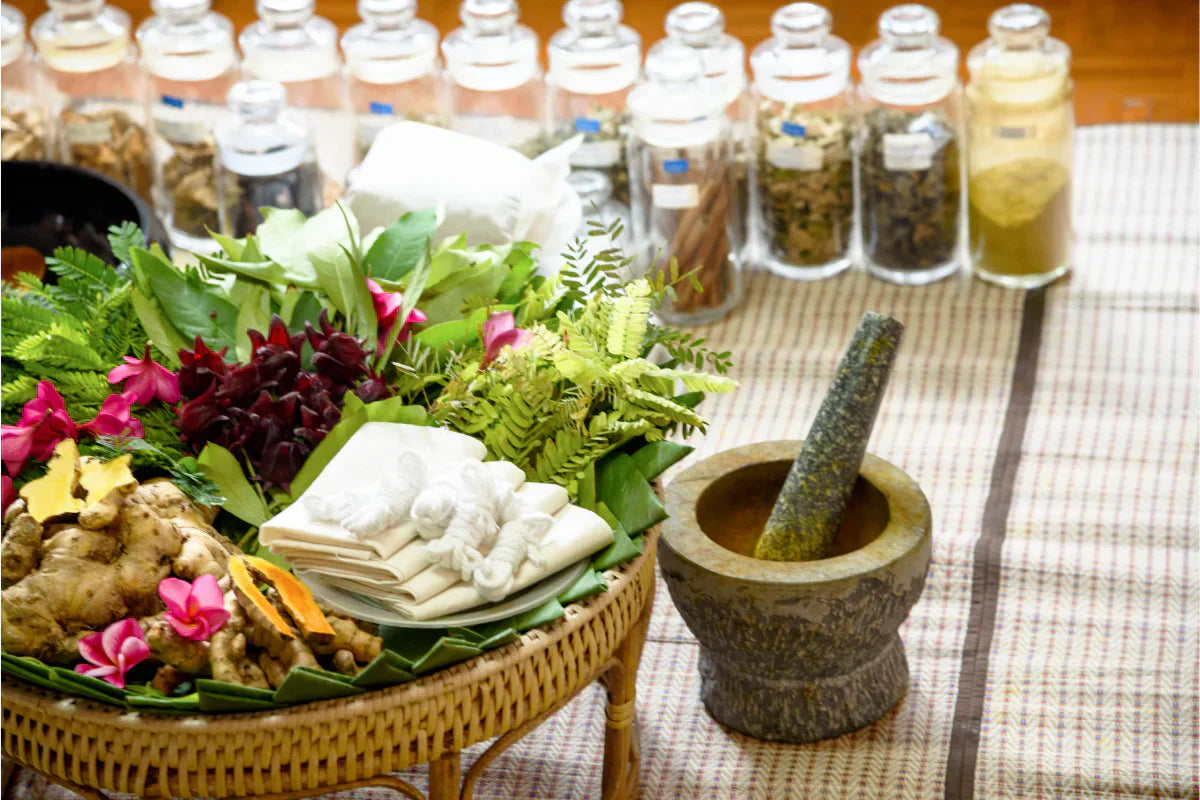The Ayurvedic Benefits of Castor Oil: From Detox to Digestion

Introduction
Castor oil, Eranda Taila, or Arandi Oil, holds a special place in Ayurveda as one of the most potent oils for elimination, cleansing, and balancing Vata Dosha. Classical Ayurvedic texts have praised its ability to purify the channels, support digestion, reduce inflammation, and promote strength. An ancient verse describes it as ‘hot, penetrating, nourishing, and rejuvenating’.
The oil is extracted from the seeds of the Ricinus communis plant, and its active ingredient is ricinoleic acid, which makes it anti-inflammatory and laxative in nature.
What Is Castor Oil in Ayurveda?
Castor oil is widely used as an internal and external medicine in Ayurvedic practice. Classical texts such as Bhavaprakasha mention its sweet taste, hot potency, and subtle penetrating nature. It produces a pungent and astringent post-digestive effect and is known to cleanse the channels, nourish the skin, and improve vitality.
Ayurveda considers Eranda Taila one of the best oils for calming aggravated Vata due to its warmth, heaviness, and nourishing qualities. It promotes digestion, stimulates appetite, and helps remove stagnation from the abdomen and pelvis. The oil is also valued for its ability to rejuvenate tissues, improve complexion, and support reproductive health. Because of its Madhur Rasa and Ushna Virya, it helps soften and mobilize accumulated waste, making it ideal for therapeutic cleansing.
Castor Oil for Detox: Ayurvedic Use in Cleansing
In Ayurveda, castor oil is traditionally used in Virechana, a purification technique that gently expels toxins through the downward route. This therapy is especially indicated when the body shows signs of toxin accumulation due to the excessive intake of oily, spicy, sour, or heavy foods. Castor oil helps clear the intestinal tract, support liver function, and cleanse the channels through its subtle and penetrating qualities.
When taken under the guidance of an Ayurvedic practitioner, castor oil supports the elimination of Ama, improves metabolism, and restores balance to the digestive fire. Virechana with castor oil can be mild or strong, depending on the dose. It should always be administered thoughtfully, as excessive intake can cause abdominal discomfort. The cleansing action of castor oil supports clarity of mind, improved complexion, enhanced energy, and better elimination.
Castor Oil for Digestion and Constipation Relief
Castor oil is one of the most effective Ayurvedic remedies for Vata-related constipation. It promotes proper elimination by stimulating the natural movement of Apana Vata. Unlike harsh chemical laxatives, castor oil works through its warm and unctuous qualities, which lubricate and soften the stool while supporting digestive strength.
It can be helpful for bloating, gas, abdominal distension, and irregular bowel habits. Since it does not aggravate Pitta excessively when used correctly, castor oil becomes a gentle yet effective remedy for chronic constipation. Traditionally, it is recommended to be taken before bedtime in warm water or milk. Individuals with sensitive digestion should use it cautiously and only for short durations.
Castor Oil for Hair Health – Benefits and Disadvantages
Castor oil is rich in omega-3 and omega-6 fatty acids, vitamin E, and proteins, making it a deeply nourishing oil for the hair and scalp. It helps reduce hair fall, promotes growth, and strengthens the roots. Its warming nature improves circulation to the scalp, enhancing nutrient supply and supporting thicker, healthier hair.
In Ayurveda, castor oil is especially recommended for Vata-dominant scalp conditions such as dryness, dandruff, and brittle hair. Massaging the scalp with castor oil, often blended with lighter oils like coconut or sesame, provides nourishment and shine.
However, due to its thick texture, excessive use may cause build-up, especially for people with an oily scalp or high Pitta. It may also clog pores if not washed out properly. Individuals with sensitive or inflamed scalp conditions should use it with caution.
Castor Oil for Skin and Face Care
Castor oil is considered beneficial for balancing dry, Vata-prone skin. Its warming and slightly stimulating nature helps improve circulation, reduce stiffness, and soothe inflammation. It softens rough patches, heals cracks, and supports the repair of minor skin injuries.
Ayurveda values castor oil for its cleansing and nourishing properties, making it useful for massage therapy to relieve joint pain and muscular tension. While it moisturizes deeply, individuals with oily or acne-prone skin should avoid applying it on the face, as its heavy nature may lead to congestion.
Check out the ayurvedic herbs for brighter skin—>
Other Medicinal and Topical Uses in Ayurveda
Gulma (Abdominal Lumps or Hardness)
Castor oil softens abdominal masses in Vata-related Gulma, especially with Kapha or Pitta involvement, promoting downward movement when taken with warm milk.
Shvayathu (Oedema and Water Retention)
Castor oil reduces oedema by supporting Apana Vata, improving elimination, and easing fluid stagnation when taken before meals for better circulation.
Vataj Grahani (Chronic Digestive Disorders)
In chronic digestive imbalance, castor oil aids Virechana, clears toxins, regulates bowels, and stabilizes digestion during disturbed intestinal function.
Udavarta and Anaha (Upward Vata and Bloating)
Castor oil corrects upward-moving Vata, easing bloating and abdominal fullness, especially when taken with milk, broths, or Triphala decoction.
Vatavyadhi (Neuromuscular and Degenerative Disorders)
Following oleation and steam, mild purgation with castor oil reduces stiffness, nerve pain, and tension, deeply pacifying Vata when taken with milk.
Deep-Seated Vatarakta (Chronic Gout)
Castor oil with warm milk helps pacify Vata and Pitta in chronic gout, reducing inflammation, pain, and accumulated toxins in joints.
Gridhrasi (Sciatica)
Castor oil, orally or through Vasti, alleviates radiating sciatica pain, stiffness, and nerve compression when used consistently for several weeks.
Katisula (Lower Back Pain)
Internal castor oil with Dashamoola or ginger water, plus topical application, relieves lower back stiffness, enhances mobility, and pacifies Vata.
Amavata (Rheumatoid Arthritis)
Castor oil eliminates Ama, reduces swelling, and eases rheumatoid pain, traditionally described as strong enough to defeat severe Amavata.
Vata Udara (Abdominal Distension or Ascites)
Castor oil with Dashamoola or Triphala reduces Vata-type abdominal distension, heaviness, and fluid buildup, supporting healthy elimination pathways.
Mutrakrichha (Painful Urination)
Castor oil with Yavakshara eases burning urination, supports urinary flow, and reduces lower abdominal discomfort in Vata-related urinary disorders.
Vataja Vriddhi (Scrotal Enlargement)
Castor oil taken with milk after oleation reduces chronic Vata-induced scrotal swelling, especially when combined with Guggulu and gomutra.
Antra Vriddhi (Scrotal Hernia)
Castor oil cooked with Bala decoction reduces hernia-related swelling, discomfort, and flatulence by pacifying aggravated Vata in the lower abdomen.
Bradhna Roga (Testicular Inflammation)
A Haritaki paste fried in castor oil, combined with Krishna and Saindhava, reduces testicular swelling and inflammation effectively.
Slipada (Filariasis)
Haritaki processed in castor oil with gomutra helps relieve filarial swelling, supporting lymphatic flow and reducing chronic Vata-related enlargement.
Castor Oil Side Effects and Precautions
Despite its many benefits, castor oil must be used with caution. Internal use is strictly contraindicated during pregnancy because of its strong stimulating and purgative effect. Overconsumption may lead to dehydration, bloating, abdominal cramps, nausea, or dizziness.
Those with sensitive digestion should avoid long-term use without professional monitoring. People with skin allergies or a highly sensitive scalp should patch test before applying castor oil externally. When used responsibly, castor oil remains one of Ayurveda’s most powerful healing oils.
Conclusion
Castor oil has been valued for centuries in Ayurveda as a cleansing, nourishing, and therapeutic elixir. Whether used for detoxification, digestive support, hair and skin care, or relief from joint stiffness, its benefits extend across wellness and disease management. Like all potent Ayurvedic remedies, it must be used mindfully and under appropriate guidance for internal therapies.
When respected and used correctly, castor oil enhances vitality, supports healthy elimination, strengthens tissues, and helps balance Vata and Kapha doshas.
Shop Maharishi Ayurveda’s Erand Oil for Digestion
FAQs
1. What is the best time to take castor oil?
The best time depends on the purpose. It is commonly taken at bedtime for constipation and used any time externally for joint pain. For therapeutic detox, timing should be guided by an Ayurvedic physician.
2. Can I drink castor oil daily for digestion?
No. Castor oil is not meant for daily long-term consumption. It should be taken only for a short duration and under supervision.
3. Can castor oil help with joint pain?
Yes. Castor oil is highly effective for joint stiffness, swelling, and arthritis when used externally. It may also be used internally in specific Vata disorders.
4. Is castor oil safe for pregnant women?
No. Internal use is contraindicated during pregnancy because castor oil is strong, heating, and can stimulate downward movement too intensely.
5. Are there any side effects of using castor oil on hair?
Side effects may arise if used excessively. It may cause heaviness, pore blockage, or irritation for sensitive scalps, especially if not washed off properly.
Popular Posts

Rheumatoid Arthritis in Ayurveda: Can Detox and Digestion Support Joint Health?
23 Jan, 2026Rheumatoid arthritis (RA) is a widely known joint condition, but did you know that Ayurveda trace...
Read more
Natural Ayurvedic Detox: Gentle Home Remedies
23 Jan, 2026What does natural detox really mean in Ayurveda? Essentially, this practice refers to the elimina...
Read more
Winter Weight Gain and Brain Fog: Ayurveda Explains Why
22 Jan, 2026What’s the trigger for winter weight gain? Why do we often experience brain fog, feel dull and he...
Read more





 Popular Read
Popular Read

















































